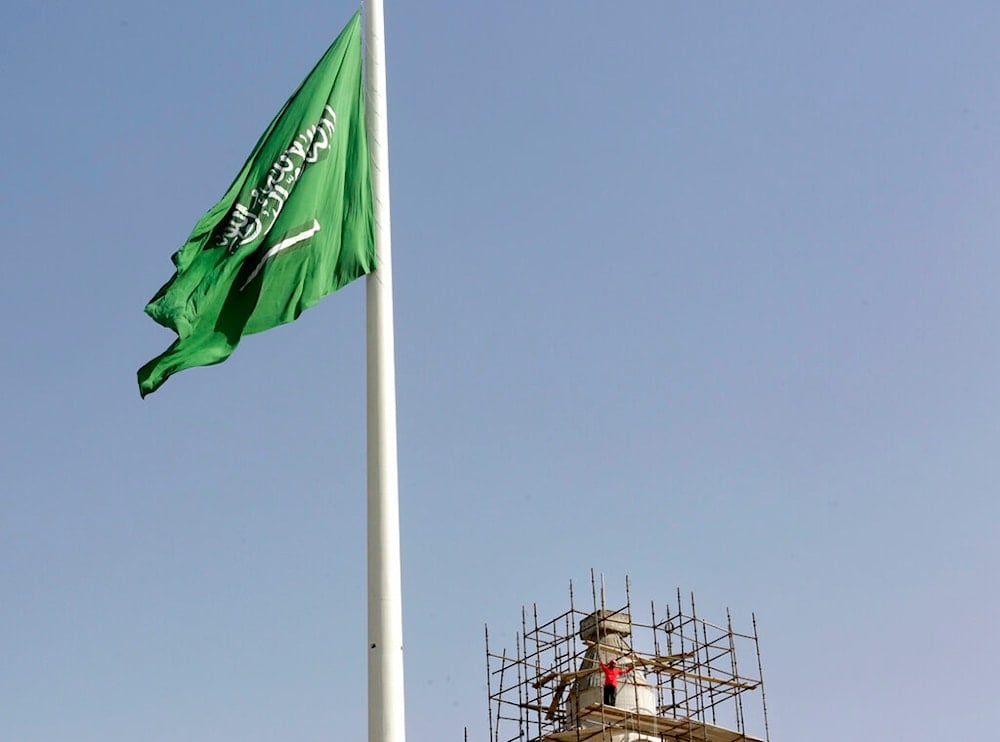Saudi Arabia faces forced labor accusations ahead of FIFA WC decision
Lodged by the trade union BWI, the complaint alleges that migrant workers in Saudi Arabia are subjected to numerous labor rights violations.
-

A Bengali worker stands over the construction of a mosque minaret as a giant Saudi flag billows in the background, at King Abdullah Square, in Jeddah, Saudi Arabia, Sunday, March 14, 2021. (AP)
Saudi Arabia, the anticipated host for the 2034 World Cup, faces serious allegations of extensive use of forced labor among its substantial migrant workforce, The Guardian news website reported on Wednesday.
These accusations have been formally lodged in a complaint before the United Nations' International Labour Organization (ILO).
The complaint alleges that migrant workers in Saudi Arabia are subjected to numerous labor rights violations, including non-payment of wages, passport confiscation, illegal recruitment fees, debt bondage, and restrictions on changing jobs freely.
'An epidemic of abuses'
The trade union Building and Wood Workers’ International (BWI), which filed the complaint, described the situation as “an epidemic of abuses,” constituting forced labor, placing Saudi Arabia in violation of its obligations under the UN’s forced labor conventions.
BWI’s complaint includes a survey of 193 migrant workers who had worked or are working in Saudi Arabia, revealing that 65% reported their employer withheld access to personal documents like passports and 63% stated they were unable to terminate their employment with reasonable notice or leave when their contract expired.
"Saudi Arabia, where trade unions are banned, blatantly disregards international labor standards and fails to compensate migrant workers who have suffered abuses for over a decade," indicated Ambet Yuson, BWI’s general secretary.
Representing approximately 12 million workers, BWI is urging the ILO to investigate these alleged violations. The complaint is backed by organizations including, Human Rights Watch (HRW), Amnesty International, and FairSquare, which focuses on human rights abuses related to labor migration and sports.
This complaint surfaces just months before the international football governing body FIFA is expected to award the 2034 World Cup hosting rights to Saudi Arabia. This development is likely to increase pressure on FIFA, which already faces calls to disqualify Saudi Arabia from hosting the tournament if it fails to comply with its human rights obligations.
FIFA’s bidding rules for the 2030 and 2034 World Cups require host countries to commit to "respecting internationally recognized human rights."
'Truly historic filing'
"The complaint effectively says that Saudi has no meaningful protections against forced labor," pointed out Minky Worden, HRW’s director of global initiatives.
She highlighted that "this is a truly historic filing and may be the only significant roadblock to Fifa’s coronation of Saudi Arabia as the 2034 World Cup host."
"Fifa must answer how it will assess and mitigate migrant labor rights risks as required by its human rights policy," Worden added.
The international football governing body "could provide a much-needed spur for labor reform" by demanding binding human rights agreements before finalizing the 2034 tournament host, emphasized Steve Cockburn, Amnesty International’s head of economic and social justice.
He warned that failing to do so would almost certainly ensure forced labor remains integral to its major event.
The Guardian recalled that in 2014, the International Trade Union Confederation filed a similar complaint against Qatar, which led to a partnership between the ILO and the 2022 World Cup host to reform its labor laws.
According to the news website, the process resulted in significant changes, such as largely dismantling the kafala (sponsorship) system in the Gulf country and introducing a minimum wage, though the impact of these reforms remains debated.
The Guardian noted that Saudi Arabia heavily relies on migrant workers, primarily from South Asia and parts of Africa, with over 13 million foreign workers in the country, explaining that these numbers are expected to increase significantly for major construction projects if Saudi Arabia is awarded the World Cup.
Read more: Saudi Arabia's Vision 2030 might be lacking a financial vision

 4 Min Read
4 Min Read








